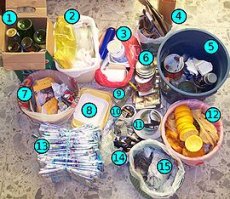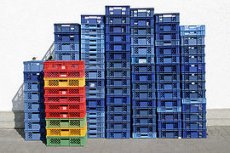Secondary Garbage Processing
 Secondary waste treatment
Secondary waste treatment
International secondary reprocessing symbol.
Processing (other terms: secondary processing♪ Recycling (waste) (English) recycling♪ recycling and waste management) - reuse or re-entry of waste production or garbage. Secondary, tertiary, etc. are the most commonly used materials such as glass, paper, aluminium, asphalt, iron, tissue and various types of plastic. Organic agricultural and household wastes are also used in agriculture with deep wood.
Importance of recycling waste
First, the resources of many materials on Earth are limited and cannot be replenished within a time comparable to that of human civilization (see non-renewable resources). Second, by entering the environment, materials tend to become polluters. Thirdly, waste and end-of-life products are often (but not always) a cheaper source of many substances and materials than natural sources.
Secondary commodities
Separated house trash. (1) glass bottles, (2) thin plastic, (3) fat plastic, (4) fibre, (5) mixed debris, (6) iron banks, (7) paper, 8) polystyrol, 9) glass, 10 batteries, 11 metal, 12) organic waste, 13) Tetrapac packing, 14) textiles, 15) toilet debris.
Paper, Carton, Gaza, Textile, TetraPak
 Black, Color, Dragon
Black, Color, Dragon
Acids, Scillos, Organica
- Petroleum products:
Masla, Bitum, Asphalt
Articles, Plates, Accumulators, Mercury Lamps, Promulsion
Pat, Pv, Pvd, Pnd
Tyres, rubber
- Biological:
Food waste, Gira, Assensation
Bullshit, Spring, Castle
- Construction:
Brick, Bethon
Russian and USSR
Recycling was of great importance in the USSR. Uniform bottles for milk, beer and cooling beverages were developed and glass-gathering points were in place throughout the country. Schoolchildren and members of the pioneering organization were involved in collecting macculature and scrap metal. Dragmetalls used in industry, particularly in electronics, have been carefully recorded.
Secondary processing technologies
A multiplicity of waste may be used again. For each type of raw material, there is appropriate processing technology.
Metal
Most metals should be recycled.
Minor or spoiled objects, so-called scrap metal, are given to the intake points for subsequent remelting.
Related posts:
 In the Volgograd Region Administration, a concession agreement was signed on public utilities, recycling, disposal (storage) of solid household waste. According…
In the Volgograd Region Administration, a concession agreement was signed on public utilities, recycling, disposal (storage) of solid household waste. According… The building is already over, and a bunch of building debris and waste remains lying, rather than seriously ruining the type of capital. As a result, today the required…
The building is already over, and a bunch of building debris and waste remains lying, rather than seriously ruining the type of capital. As a result, today the required… I ve done a lot of franchise monitors, but I ve got the usual bids, a cafe or a store that s already starting to compete with me, I thought I was bored, telling…
I ve done a lot of franchise monitors, but I ve got the usual bids, a cafe or a store that s already starting to compete with me, I thought I was bored, telling… What are the rules for sorting debris on French Riviera? When we rented an apartment in Paris, there were a few large tanks in the interior courtyard where classic…
What are the rules for sorting debris on French Riviera? When we rented an apartment in Paris, there were a few large tanks in the interior courtyard where classic… Is discipline important in investing? Without any doubt it is true! A disciplined investor will never buy securities without serious analysis or pay attention to…
Is discipline important in investing? Without any doubt it is true! A disciplined investor will never buy securities without serious analysis or pay attention to… Structural debris: brick, brisket, concrete, stoves obtained during the dismantling of construction sites are transformed into a secondary building block on GOST…
Structural debris: brick, brisket, concrete, stoves obtained during the dismantling of construction sites are transformed into a secondary building block on GOST… Professional presentation demands more than just content - it requires the right display platform. The Black Easel stands out as a sophisticated solution for artists…
Professional presentation demands more than just content - it requires the right display platform. The Black Easel stands out as a sophisticated solution for artists… An incineration factory in the heart of Vienna is unique not only because it does not completely damage the environment, but it also, unlike its collars, decorates…
An incineration factory in the heart of Vienna is unique not only because it does not completely damage the environment, but it also, unlike its collars, decorates… The Territorial Waste Management Scheme was held by the Parliamentary Hearings at Medoldum Parliamentary hearings of the Regional Waste Management Scheme were held…
The Territorial Waste Management Scheme was held by the Parliamentary Hearings at Medoldum Parliamentary hearings of the Regional Waste Management Scheme were held… Environmentally sound behaviour is very often consistent with the principles of rationality, servitude, prudential treatment of purchases, by their time, to environmental…
Environmentally sound behaviour is very often consistent with the principles of rationality, servitude, prudential treatment of purchases, by their time, to environmental…